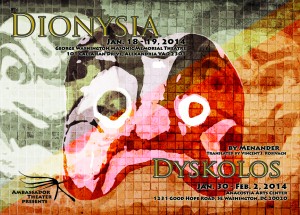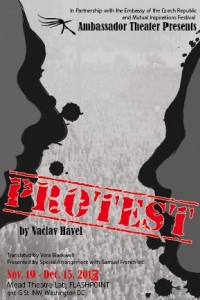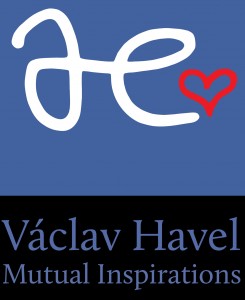
Dyskolos
Rarely does theatre make you feel educationally illuminated and shamelessly entertained at the same time, but such are the charms of Ambassador Theater’s production of the ancient Greek comedy Dyskolos by Menander.  Dyskolosfeels like a genetically combined blend of Moliere’s The Misanthrope, Italian commedia dell’arte (complete with masks), and The Three Stooges. It is broad fun, broadly and expertly rendered in a short run at the Anacostia Arts Center.
Ambassador Theater is in its fifth season of presenting theatrical works from across the globe and, in this case, across a considerable period of time. Menander was a leading writer of the Greek “New Comedy†era (about 2,300 years ago) which focused on finding humor in the lives of everyday characters. He had a considerable impact on Roman playwrights, but most of his work was lost in the Middle Ages.  Dyskolos is his only work to have survived almost entirely intact.
The god Pan sets the scene by explaining that he has caused a wealthy young man to fall in love with the innocent daughter of a grumpy old farmer. One wonders if this is where all of those jokes about the proverbial “farmer’s daughter†started. The farmer becomes enraged if any stranger steps onto his property or tries to talk with him. (Dyskolos can be translated as The Grouch, The Misanthrope, The Curmudgeon, The Bad-tempered Man or Old Cantankerous).
The young man goes through various strategies first to persuade the farmer to allow his daughter to be married and then to persuade his own father to allow the marriage to occur. As sometimes happens in classic comedies, a second betrothal results as well.
Four actors play roughly a dozen roles with the aid of expressive masks that each prepared with the assistance of master mask designer Tara Cariaso. Connor J. Hogan demonstrates great comic gifts as the painfully lovestruck young man, as his father’s cook who runs afoul of the farmer, and even as the young man’s mother. Nick Martin makes the farmer both impressively disagreeable and intimidating.
Lily Kerrigan is at her charming best playing a clever and mischievous young slave who enjoys tormenting the farmer. She also has considerable stage time as the farmer’s older stepson who lives separately with his mother and who aids the young lover in his quest. Sarah Collins completes the versatile quartet by playing multiple roles ranging from the farmer’s old slave to a contrary sheep.
Director Stephen Shetler keeps the action high-spirited and the acting appropriately broad, often happily verging on slapstick. The action is pleasantly broken through scene changes that feature the actors in stylistic movements choreographed by Julia Tasheva.
At times, it may take a few moments for the audience to follow the new scenes. A short synopsis in the program and/or a character list would have proven useful. The characters, however, set up the actions in an understandable manner soon enough.
Ancient Greek comedy may not be everyone’s cup of tea (or perhaps glass of ouzo). Yet these standard characters and their all too common desires are readily accessible. The play is appropriately subtitled “An Ancient Greek Comedy with Modern Sensibilities.â€Â If you are seeking a theatre experience that is both novel and yet familiar enough to be entertaining, Ambassador Theater’s production of Dyskolos is only playing for this weekend only.
Dyskolos Written by Menander Translated by Vincent J. Rosivach . Directed by Stephen Shetler . Produced by Ambassador Theater . Reviewed by Steven McKnight.
Recommended
DYSKOLOS
Closes Sunday, February 2, 2014
Anacostia Arts Center
1231 Good Hope Road SE
Washington, DC.
1 hour, 20 minutes, no intermission
Tickets: $35
Saturday and Sunday
Details and Tickets



 Havel’s work paints a world composed of two stark opposite positions; either dissident or compromiser. He raises question to ponder. Who can you trust when your own freedom is at stake? What will you do to survive? How far will you go to prevent the loss of your own livelihood, or a risk aÂ
Havel’s work paints a world composed of two stark opposite positions; either dissident or compromiser. He raises question to ponder. Who can you trust when your own freedom is at stake? What will you do to survive? How far will you go to prevent the loss of your own livelihood, or a risk a 











